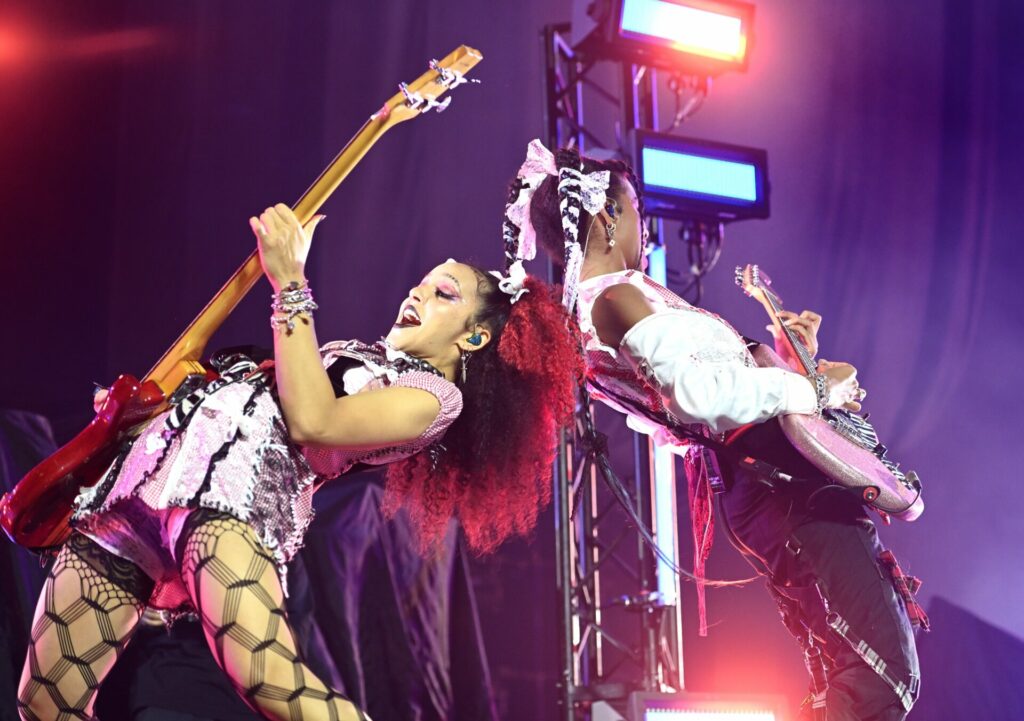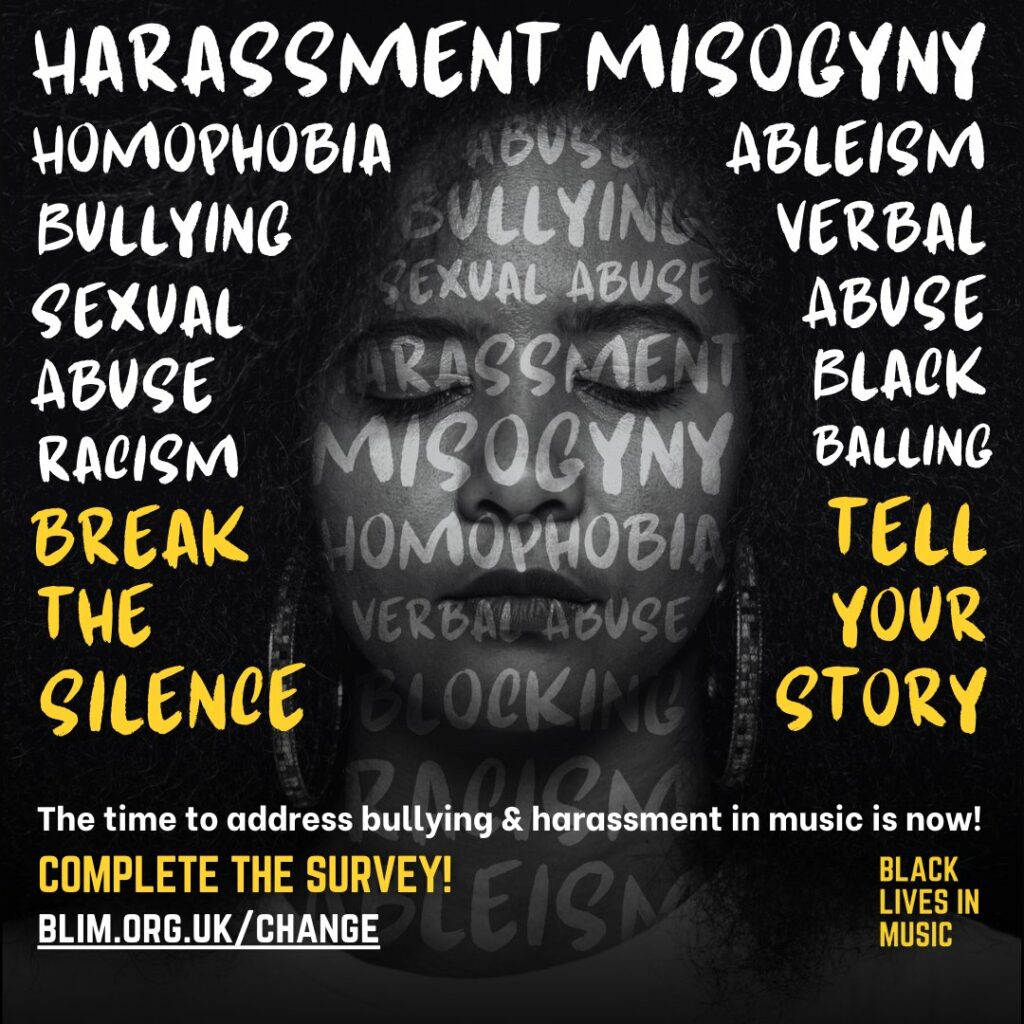Black Lives In Music launches new survey to tackle bullying and harassment
The latest drive aims to "eradicate bullying and harassment" from the music industry.
By Nick Reilly

Black Lives In Music (BLIM) has announced a new survey to tackle the effects of bullying and harassment in the music industry, with the new initiative supported by figures including Nova Twins.
The organisation was founded in 2021 and aims to address racial inequality in music by creating further opportunities for Black, Asian and ethnically diverse people working within the industry.
Today (April 18), sees the organisation share details of their ‘YourSafetyYourSay’ survey on bullying and harassment in the music industry – a direct response to the Misogyny In Music Inquiry which was spearheaded by Parliament.
The latest initiative from BLIM comes after the organisation unveiled their ‘Being Black In The Music Industry’ report in 2021, which revealed that 86 per cent of Black musicians faced barriers to career progression. Some 63 per cent of Black music creators had also experienced direct or indirect racism in the music industry, which rose to 71 per cent for racial micro-aggressions.
The latest drive calls on music professionals to take part in “ground-breaking research” with an aim to “eradicate bullying and harassment” from the music industry.
“After becoming aware of shocking abuse, BLIM will use the anonymous survey to collect real-world data. This will inform legislation and the work of the new Creative Industries Independent Standards Authority (CIISA) and the wider music industry,” a press release reads.
“It will also be used to support BLIM’s forthcoming Anti Racist Code of Conduct and reporting tool, which will work towards eradicating discrimination, bullying and harassment throughout the music ecosystem.”
The Department of Culture, Media and Sport (DCMS) has also requested their data to inform future.

Nova Twins said: “We have to acknowledge the barriers faced by POC talent within the music industry. Far too often, Black musicians and industry professionals encounter bullying and harassment, stifling their voices and existence. Discriminatory labels limit our creativity and opportunities, hindering our ability to thrive.
“Hearing from other artists like us with very similar experiences, both independent and on majors, has been eye-opening. These hurdles, and plenty more like them, could’ve easily held us back from reaching our full potential. It’s a story too many of us share. That’s why the ‘YourSafetyYourSay’ survey is a vital step towards amplifying marginalised voices, uncovering untold stories that need to be heard.”
You can sign the survey here.
They added: “We were often told that Black women shouldn’t make the music we were making because there was supposedly no market for it. We’d be pushed to fit into stereotypes, saying we should go more hip-hop or R&B. It wasn’t just the labels; even punk/Riot Grrrl publications excluded us from event coverage, which felt telling considering we were often the only POC artists on the bill.
“Our music and performance styles were labelled as too intense or aggressive. Yet, the same energy from white male counterparts would be praised as ‘rock and roll’. At shows, our position as musicians was frequently undermined, with people post-show assuming we were backup dancers, rather than the rock act just performing on stage.”
Singer VV Brown added: “The ‘YourSafetyYourSay’ survey, is needed to help eradicate discrimination, bullying and harassment in the music industry, especially towards Black and POC individuals, and to have somewhere to report these incidents. This is such important work, and I fully support Black Lives In Music’s valiant work, and urge those comfortable to share their stories.
“As a Black woman, I often felt silenced and excluded, labelled as aggressive or aloof. Bullying ranged from isolation to daily emails with derogatory language. Even in high-profile fashion settings, I felt marginalised, as if I didn’t belong. I faced a barrage of racist comments online… enduring over a million comments, leaving me feeling deeply unsafe.”
She added: “The most hurtful bullying I experienced came from left-wing liberals who professed to support equality but hindered Black individuals’ opportunities. One of the most painful incidents was when a prominent DJ on national radio mocked my appearance with a caller. I cried for days… even though it marked my first radio play.”
Brown concluded: “The expectation to internalise and tolerate [bullying in the workplace] was pervasive. There was a constant fear that expressing my pain would lead to being labelled as overly sensitive or even being blamed as the aggressor.”
Charisse Beaumont, Chief Executive of BLIM, said: “We are flooded with stories from people who have experienced bullying and (sexual) harassment in the music industry. They are shocking and it’s clear that high-profile cases in the media are the tip of an iceberg. It can happen to anyone and it is often rooted in misogyny, racism, homophobia, transphobia and more.
“Bullying and harassment is normalised in the music industry, as shown by the Misogyny In Music Inquiry. To turn the Inquiry findings into action, we need the information. The data, especially from underrepresented groups, just doesn’t exist.
“The bullying and harassment survey will be a comprehensive survey to capture everyone’s voices, especially those rarely heard. We need to understand what is really going on behind closed doors so we can tailor interventions.”
Beaumont added: “It’s time to double up our efforts against bullying, (sexual) harassment and discrimination. Black Lives in Music is fighting to ensure equality is standard in the music industry. Together, we can create a safe music industry where everyone thrives.”
